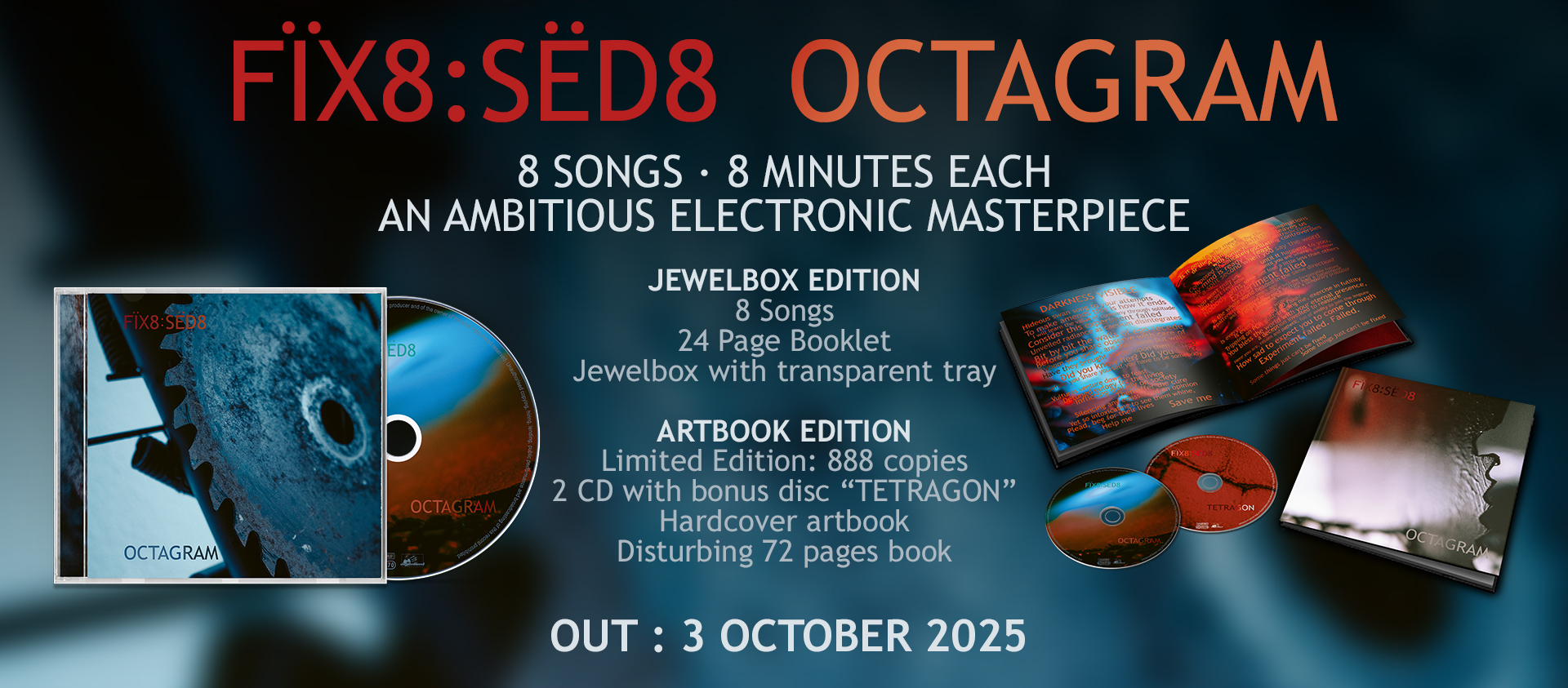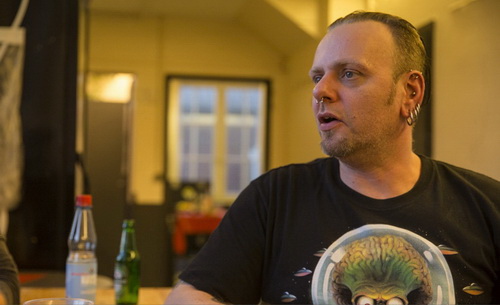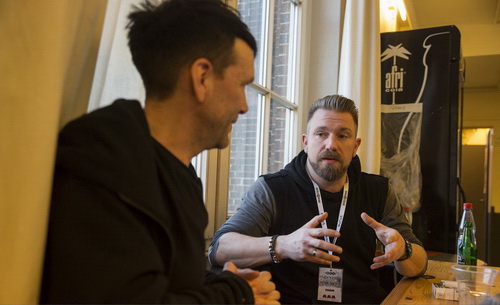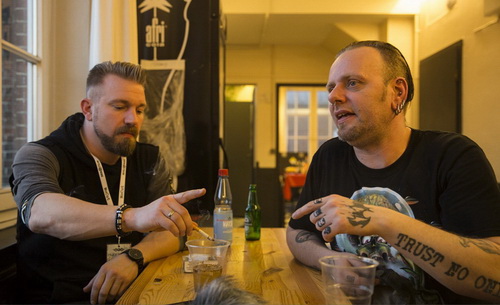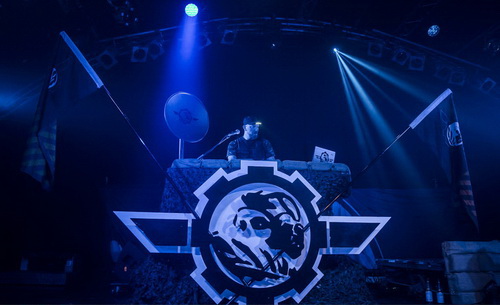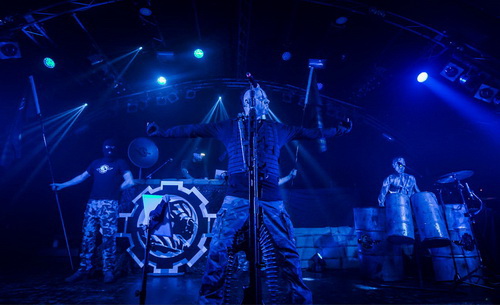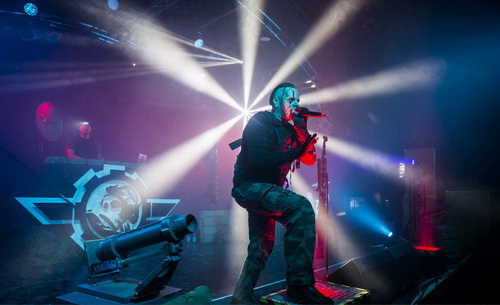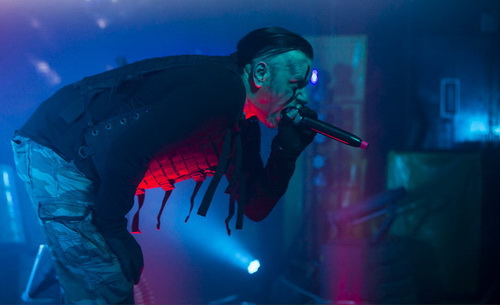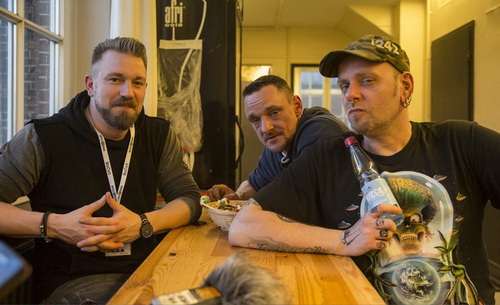
Locked and loaded and ready for a new era – Funker Vogt interviewed
Posted In Interviews,Slider by Jimi Nilsson
Over the last decade they’ve produced eleven solid albums plus several remix albums veering from stereoscopic EBM to spiky aggrotech. In September 2018 Funker Vogt released their latest album ”Wastelands”, marking over two decades of their existence whilst cementing their new, and at the same time old, home at RepoRecords.
“Wastelands” sees the German trio scaling new creative heights with re-energised confidence and with a creative productivity never seen in the band’s history before. When new singer Chris L. (Agonoize), Gerrit Thomas and René Dornbusch came to Hamburg with the Hybridize Festival tour we sat down for a chat about Funker Vogt 2.0, the new band setup in general and the impact of Chris’ being the new vocalist in particular, and the politics of an apolitical band.
Evolving into Funker Vogt 2.0 and a new sound
The story may have been written differently if it wasn’t for René Dornbusch. The musical landscape drastically changed the past decades, contemporaries have come and gone, and it was close to come to an end even for Funker Vogt after the release of “Companion in Crime” in 2013.
René convinced founding member Gerrit Thomas to release just one more album, an album inviting guest vocalists, because of original vocalist Jens Kästel’s decision to leave the band after “Companion in Crime”. One of the vocalists that were asked to sing on one song was Agonoize’s Chris L. but some “drunken lullabies” later it ended up with Chris doing all the songs, and with the release of “Code of Codunct” in 2017, a new exciting era of Funker Vogt started.
Ahead of the interview Gerrit points out that Chris will do all the talking, but in the end he couldn’t stay away from the discussion. And we jump-started with the latest configuration of the band, the Funker Vogt 2.0 version.
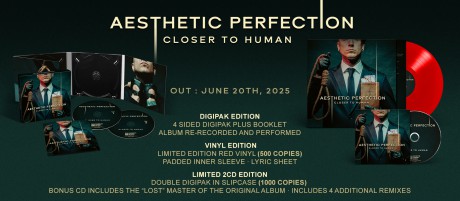
Many bands that have been around as many years as you sometimes get a legendary status. Do you feel like legends or pioneers on the scene?
Chris: Maybe as a DJ, I’ve been doing that since I was eleven. My first record I got, when I was eleven, was “Geography” by Front 242 and then I started to listen to Skinny Puppy. I saw Front 242 live the first time in 1984, Fad Gadget a few times – I even saw when Depeche Mode opening for Fad Gadget. That’s electronic pioneers!
But musically, Agonoize invented nothing, Funker Vogt created a movement but I wasn’t part of the band at that point, I’ve just been in the band for a few years. I actually didn’t follow them that much either (laugh). But we have been friends a very long time, for about twelve years. And they didn’t listen to Agonoize either (laugh).
But when Funker Vogt turned up it was a new kind of aggressive EBM that became quite popular in the nineties and Agonoize built on that later. Now, when you’ve joined forces, do you think the “new” Funker Vogt adds something new to the scene?
Chris: If it’s like that it just happens! When I joined the band, the first album [“Code of Conduct”] was basically done and it was supposed to be twelve songs with different guest singers – wasn’t it like that? [turning to Gerrit] – and Gerrit asked me to do one song, and one song only.
Well, as many bands we write a lot when we we’re drunk in the middle of the night (laughs) and Gerrit was like “You can sing all the songs!”.
Gerrit: It was basically the drunken me saying “Why not sing it all!?”.
Chris: “I’m gonna do it all!”, I said, and that was what happened. On the second album you can hear how we started to get into it, finding a way to collaborate and to get my voice and the music of Funker Vogt to fit together, and for me to know what I was expected to sing. And now it works because we like the way we do things together.
You have gone through a few transitions where you’ve changed your frontman a few times. That’s the person who basically represents the band on stage. How much does it affect the band when you change the frontman? What impact has Chris made on the overall representation of Funker Vogt?
Gerrit: It’s really important to find a new singer who’s into the scene, who’s really part of it, and I have to admit we made a bad choice before we got Chris in.
It all fits together now and Chris is a name on the scene, which of course is good for the band as well, and I would never consider to work without him today.
Chris: We didn’t knew what to expect from the album. We did “Code of Conduct” and the first gigs felt like [making a disappointing sound] because I wasn’t really part of the band, didn’t write any songs and didn’t feel comfortable in the beginning. For me it was like being “the new one” and it didn’t matter if they said “No man, stop that shit! You’re part of the band”. I had a lot of respect for them; they had done this for sixteen years before I came into the band.
Gerrit: But I also think that we didn’t see it as a new start when we reformed the band and did the first gigs. We just thought “Let’s go for it and see what happens”.
Chris: There are different ways of working on stage and the old singers had their ways but I said “I don’t feel comfortable working that way, we have to find each other”. Last year we played a show in Moscow; that show was awesome because we finally worked together and did our thing together for the first time, and we just burned down the venue that night (laughs). This was two months before we did the latest album “Wastelands”.
Was that when you finally felt like you were part of Funker Vogt “for real”?
Chris: After that momentum I didn’t see myself as the new singer anymore but someone being part of the band, and that helped a lot when we started to record “Wastelands”. We planned to do fifteen songs in two weeks in the studio but ended up with twenty songs in three and a half days.
In the beginning I didn’t think about it. As I said before, Gerrit just sent me three tracks and I was supposed to pick one but he said “Maybe you’ll like one of the others as well?”. And I did one more and then the third before he came back to me again, like “Do all of them because the other guest singers don’t get back to me and I don’t care about them anymore”. I just slipped into it.
Suddenly WGT booked us for a show and we were like “OK, we just have to finish the album, it’s just two months to go”. So, I never really had time to think about it, but when the album almost was finished I was like “Fuck, how do I represent this on stage?”.
Gerrit: We really had to get the stuff ready just because of Wave Gotik Treffen and it takes time to put an album out with label promotion and that stuff. That was a really quick process.
Chris: And my point was that I wanted to change the show. I had ideas and talked to my tour manager in Agonoize about it. Also with René, who is a very good technician as well and can make stuff work out as I want them to be, and just put them together to realize those ideas; I just said “Do it” (laughs), and they did it!
For WGT I wanted to rent a cheap T-shirt cannon and it was something like €240 for an hour, at weekends you have to pay €680, just for shooting three T-shirts and I was like “We can do something better and build it ourselves”. I just did some groundwork, had the basic ideas and everything just started to happen.
Shows are important to me and I don’t like when people stand with the mic doing nothing and just have boring videos in the background. If you don’t have talent you have lots of videos on stage (laughs).
You had a hiatus for a few years before “Code of Conduct” came out and fans today usually tend to forget bands that are gone for a while. Did you expect people to remember you when you made your comeback?
Chris: We weren’t really aware of that. Gerrit wanted to call it all off and put it all to an end but because of René the band is still alive. He said “Let’s do one more album”.
Gerrit: I was completely fed up with forming a new band with a new singer, and the idea was to make one last Funker Vogt album with guest vocalists, and I asked quite a few.
Chris: As usual I was the only one who said “Yes, let’s do it”. And then shows started coming but it came with some kind of a shitstorm in the beginning where people were like “Is this guy singing in Funker Vogt as well?”. But in the end I showed people I can sing, it’s just that with Agonoize I’ve always been limited with that. Agonoize never wanted me to sing, but I have been doing lots of metal stuff and was in a grindcore band many years ago and knew I could do it.
But to get back to the question. It just happened, we didn’t plan for anything really.
To me the last two albums, “Code of Conduct” and “Wastelands”, sound a bit different and have a more danceable beat where you take your signature sound of EBM and marry it with futurepop. What happened, musically, during the four-year hiatus, between “Companion In Crime” and “Code of Conduct”?
Gerrit: When you restart and want to change everything to get a fresh sound, a four-year long break is good (laughs).
Chris: He just wanted to get away from his Nintendo Gameboy sound (laughs).
But you also need to consider that he was pushing my voice to a new level, I didn’t know I could sing some of those songs before it happened, and it was just by accident. He was recording and I tried to switch between a softer voice to a rough one and it just worked.
Gerrit: You sounded like Justin Bieber!
Chris: Hey! You asshole asked me to do it, come on (laughs)!
But I was going from soft singing to metal screaming and somehow I found myself doing melodic screaming and Gerrit just recorded it. Later, when he sent me the recording, I was like “Who is singing this?”. He just said “With this voice we can make it sound like that”, and we found a perfect collaboration. And that’s what I mean, he pushed me to a new level because we tried a lot of stuff out. I never had this kind of experience before, that was new for me.
I was also sick of Agonoize at that point and without Funker Vogt there wouldn’t have been anymore Agonoize either because I was stressed. That René was pushing for Funker Vogt to put out another album was the best that could have happened [a lot of high-fives to celebrate René’s perseverance].
Gerrit: But we really believed in this when we finally started to do it and we’re really happy about what came out of it. It’s more club oriented music, more beats, more groove, great vocals by Chris and a fresh new kind of music for us.
Chris: “Wastelands” is the best thing I’ve done in my life much because I’ve used my voice in completely new ways. And there’s so many club hits on it.
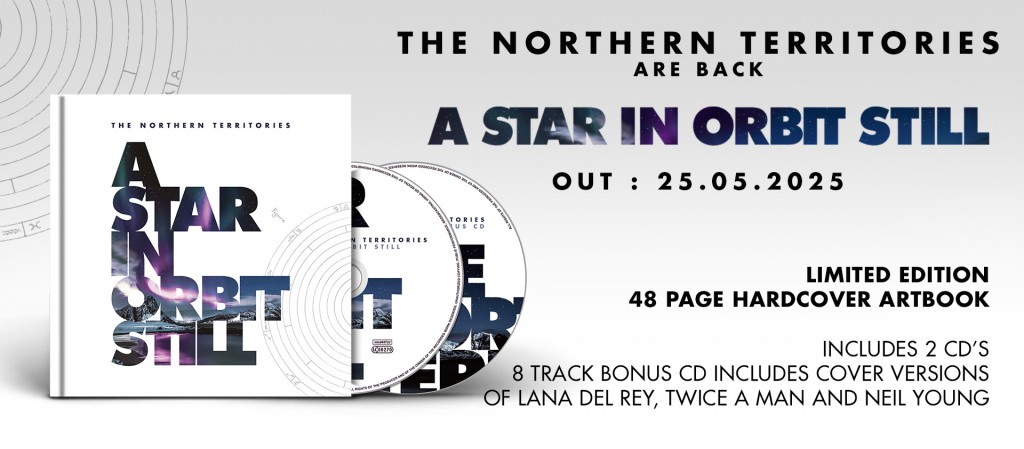
“Funker Vogt have never been pro-war”
Watching Funker Vogt live or analyzing their artwork, song titles and album titles may give you the impression of a band coming from a very political environment. Militaristic fashion and warmongering references in “Lock and Load” mixed with politically influenced songs as “Brexshit” give you the impression of a band taking a stand on the political scene. However, despite their image as political messengers it’s rather the contrary. In fact, Funker Vogt’s message is anti-war.
Last year I had a series of discussions with different bands, bands across all genres actually, about music and politics. And for instance, most punk bands consider music and politics to form a unity. You have a lot of political themes in your songs and in how you present yourself in artwork, on stage and in press photos. How much of that is part of the band image and how political are you as persons?
Gerrit: It may look like that and we want people to start thinking about things, but there’s no solid message in there.
Chris: I’m a punk from the beginning. I’m a businessman when it comes to business, but I grew up as a punk. I left home when I was very young and lived a year in a punk squat in Kreuzberg and started my career as a third-class drummer in a punk rock band and still consider myself to be a punk.
I’m very political myself and I think that’s new for Funker Vogt. Just take “Brexshit”, that’s the best example of it. Europe is falling apart and I was writing about it on “Code of Conduct” and now it’s actually happening, just like I was having a premonition. Our make-up artist, Sarah, is from London and she says that what’s happening in England is just crazy at the moment.
But we’re not as Agonoize that is more political, it’s just that I took some of that attitude with me, but it’s way less political in Funker Vogt although I can’t let stupid things that happen in society just pass by. If something is wrong I’m like “Fuck that, it’s wrong and people have to become aware of it”.
I just recently changed my rider and is very clear about not having any Nestlé products on our tour because they said “Water is no human right”. You can’t support a company like that, I’m not going to support their products. Fuck that! That’s the punk in me coming out.
But is it your role as musicians to approach politics in your music and try to affect your fans in a certain direction?
Chris: No no no! I don’t need to be like punk rock singers and be too political. But I use a moderate way of complaining about things, just to make people aware and change their way of thinking. But it’s never ever going to be like in Agonoize where I’m more radical about things. In Funker Vogt we have rules and I accept that because we’re a band. We’re going in the middle direction, not to the left or to the right, just being a bit moderate about things.
In Funker Vogt I just want people to start thinking, and I remind them about it at times, but in Agonoize it’s radical and I say “This is fucking wrong, change the way you think about it”.

Gerrit: I wouldn’t say it’s forbidden but we really don’t want that in Funker Vogt. You can build your own opinion but we won’t do that for you with Funker.
But why focus on Brexit? How about problems in German politics? That’s a topic on its own.
Chris: Do you really want to know what the problem with Europe is?
In Germany we’ve never questioned anything about Europe; in Scandinavia you have your own currency and don’t want the Euro anyway, you probably know about that yourself. But when we got the Euro it changed everything and prices doubled from one day to another. A package of butter used to cost 1.20 D-Mark [former German currency] and then it changed to 1.20 Euro [at the change in 2002 1€ was equivalent to 1.9 D-Mark] and nobody said “We have the Euro now but for what reason?”.
The problem is that although we have a common currency everybody is very nationalistic about their money. The notes and coins in Germany are connected to a German background, Greece have their Greek Euros and Spain their own [Euro’s have different designs connected to each member states’ history and culture]. What the fuck is wrong with people? If we have a united Europe we should work for a united background, otherwise the idea of a united Europe doesn’t make sense. That’s where the problems start, with a big ego and everything.
That’s what “Brexshit” is about. Europe didn’t work out from the beginning because Scandinavia said no, England wasn’t sure to join but did it and now they’re leaving, and now Europe is falling apart, it’s a disaster.
And it’s also a problem for us; if we want to play in the UK in the future we need to have visas just like Russians need today, and it will be too expensive to play in the UK since it will cost a lot more money to get in.
This is where Europe is falling apart, we’re not united anymore, but we need to step back. No one is more important than anyone else. England is not more important than Germany and Germany is not more important than Poland. What we need is a European community but we don’t have the feeling of a European community.
But I don’t tell people that they have to think like me or in a any other way, it’s more like “Think about it and you may change your way of thinking because it might be wrong. Think about it one more time”. That’s our message in the lyrics. Don’t judge a book by its cover.
Gerrit: That’s how we’ve always done it. Songs like “Fortunes of War” is about that you can never win a war. It’s about provoking people, but it’s really anti-war.
Chris: And that’s what I mean, Funker Vogt have never been pro-war, it’s just wrong; it’s not what our military outfits are about.
You gave much credit to René for Funker Vogt still being here and obviously he has been quite productive because you have released two albums in two years, both in 2017 and 2018. Are you already working on a third album?
Chris: Not directly because this last album has panned out really well and we will give it some time and get back to work in the summer again, and we said that we maybe put out an EP in the fall.
We’ve made two albums in two years and now we have two massive singles out and there’s no remixes out because we have really great songs at the moment and don’t need remixes. Like I said, when we went into the studio with “Wastelands” we expected to record maybe fifteen songs in one and a half to two weeks and did twenty songs in three and a half days. He [pointing at Gerrit] didn’t expect my voice to last longer than a day (laughs).
About a new album; we’ll start this summer and the goal is to have it out in January or February next year. That’s what we can say about a new album (laughs).
Photos for Release by: Mandy Privenau
